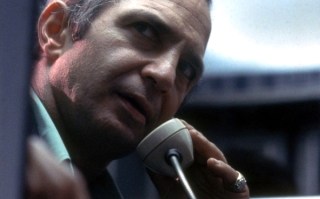On the surface, revered American filmmaker John Cassavetes’ The Killing of a Chinese Bookie is a meandering, almost impenetrable tale of sweaty strip joints and sleazy gangsters. Culled of 25 minutes of footage after the original 1976 cut bombed at the box office, the leaner 1978 re-edit is undoubtedly the easier watch. Yet, with both versions now available on a new BFI rerelease, it’s definitely worth viewing Cassavetes’ piece in the raw before he was cajoled into compromising his vision, especially since his lead character is essentially a representation of himself – a man who abhors the idea of compromise.
Ben Gazzara plays Cosmo Vitelli, the owner of a backwater strip club who is content to be the king of his own little world. He rides around in a limo, drinks champagne with beautiful woman and works hard to maintain what he believes to be an idyllic existence. Unfortunately, however, Cosmo ends up owing a gambling debt of $23,000 to some local mobsters placing his club in jeopardy. When he is offered the opportunity to clear his debt by carrying out the murder of a business rival of those he owes, Cosmo’s hand is forced much to his own chagrin.
Based on an idea Cassavetes concocted with Martin Scorsese, it’s easy to draw parallels between the Killing of a Chinese Bookie and Scorsese’s mean streets. Both are concerned with the fringe elements of the underworld; the street hustlers and local Mafioso who are big fish in their own tiny ponds. Gazzara’s Cosmo is near the bottom of the food chain, but seemingly content with his lot. He might not have much and his business might be unsavoury, but it’s his thin slice of the American dream and he will protect it at all costs. It’s a solid plot and though the improvised script, editing and camera work swings from inspired to shambolic, the film just about hangs together – even when it’s a struggle to take in.
The problem with most of Cassavetes’ pictures – for some at least – is exactly what makes them so interesting to others. It’s difficult to separate the man from his art and you’re constantly wondering if his metaphors are deliberate or accidental. In the case of The Killing of a Chinese Bookie, it’s well-documented that Cassavetes poured a lot of himself and his experiences into Cosmo and the film is something of an allegory of his struggles within the movie industry. Both men want to be left alone to do what they do, but are pressurised by outside forces into making decisions they don’t particularly want to make.
Of course, to some extent they are both agents of their own downfall. They choose to operate in murky world full of cut-throats and double-crossers which will always have it’s risks but for them, it’s a risk worth taking. The Killing of a Chinese Bookie is undoubtedly hard work, but it lingers in the memory and is a good introduction to Cassavetes’ eclectic canon. If you’re looking for entertainment then look elsewhere but if you’re in the mood for something cruel and unusual, you might want to give it a shot.
Lee Cassanell



